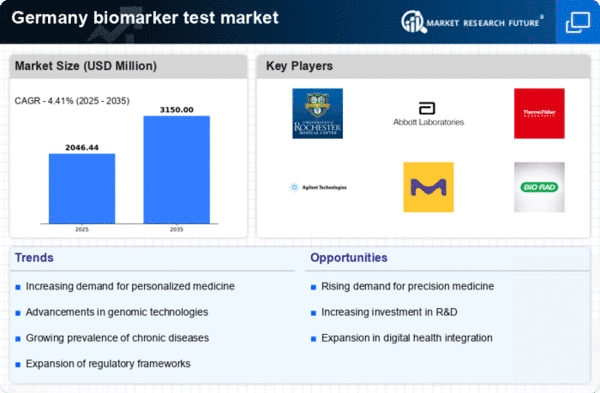Regulatory Framework Enhancements
The evolving regulatory landscape in Germany is shaping the biomarker test market. Recent enhancements in regulatory frameworks aim to facilitate the approval and commercialization of innovative diagnostic tests. The German Federal Institute for Drugs and Medical Devices (BfArM) has streamlined processes for biomarker test validation, which is expected to encourage more companies to enter the market. This supportive regulatory environment is likely to foster innovation and competition within the biomarker test market. As a result, the availability of diverse and advanced biomarker tests is anticipated to increase, benefiting both healthcare providers and patients.
Rising Prevalence of Chronic Diseases
The increasing incidence of chronic diseases in Germany is a pivotal driver for the biomarker test market. Conditions such as cancer, diabetes, and cardiovascular diseases are becoming more prevalent, necessitating advanced diagnostic tools. According to recent health statistics, chronic diseases account for approximately 80% of healthcare costs in the country. This trend underscores the need for effective biomarker tests that can facilitate early detection and personalized treatment plans. As healthcare providers seek to improve patient outcomes, the demand for biomarker tests is expected to rise significantly. The biomarker test market is thus positioned to benefit from this growing need for innovative diagnostic solutions that can address the complexities of chronic disease management.
Investment in Research and Development
Germany's commitment to research and development (R&D) in the healthcare sector is a crucial factor driving the biomarker test market. The government and private sector are investing heavily in innovative technologies and methodologies to enhance diagnostic capabilities. In 2025, R&D spending in the healthcare sector is projected to reach €40 billion, with a significant portion allocated to biomarker research. This investment fosters collaboration between academic institutions and industry players, leading to the development of novel biomarker tests. The biomarker test market is likely to experience accelerated growth as new discoveries translate into practical applications, improving diagnostic accuracy and patient care.
Technological Integration in Healthcare
The integration of advanced technologies in healthcare is transforming the biomarker test market. Innovations such as artificial intelligence (AI) and machine learning are enhancing the accuracy and efficiency of biomarker tests. In Germany, healthcare facilities are increasingly adopting these technologies to streamline diagnostic processes and improve patient outcomes. The biomarker test market is expected to benefit from this trend, as AI-driven analytics can provide deeper insights into patient data, leading to more personalized treatment approaches. As technology continues to evolve, the potential for more sophisticated biomarker tests will likely expand, further driving market growth.
Growing Demand for Preventive Healthcare
The shift towards preventive healthcare in Germany is influencing the biomarker test market positively. As the population becomes more health-conscious, there is an increasing emphasis on early detection and prevention of diseases. Biomarker tests play a vital role in this paradigm shift by enabling proactive health management. Surveys indicate that over 70% of Germans are willing to undergo regular health screenings, which include biomarker testing. This growing demand for preventive measures is likely to drive the biomarker test market, as healthcare providers expand their offerings to include comprehensive screening programs that utilize advanced biomarker technologies.
















